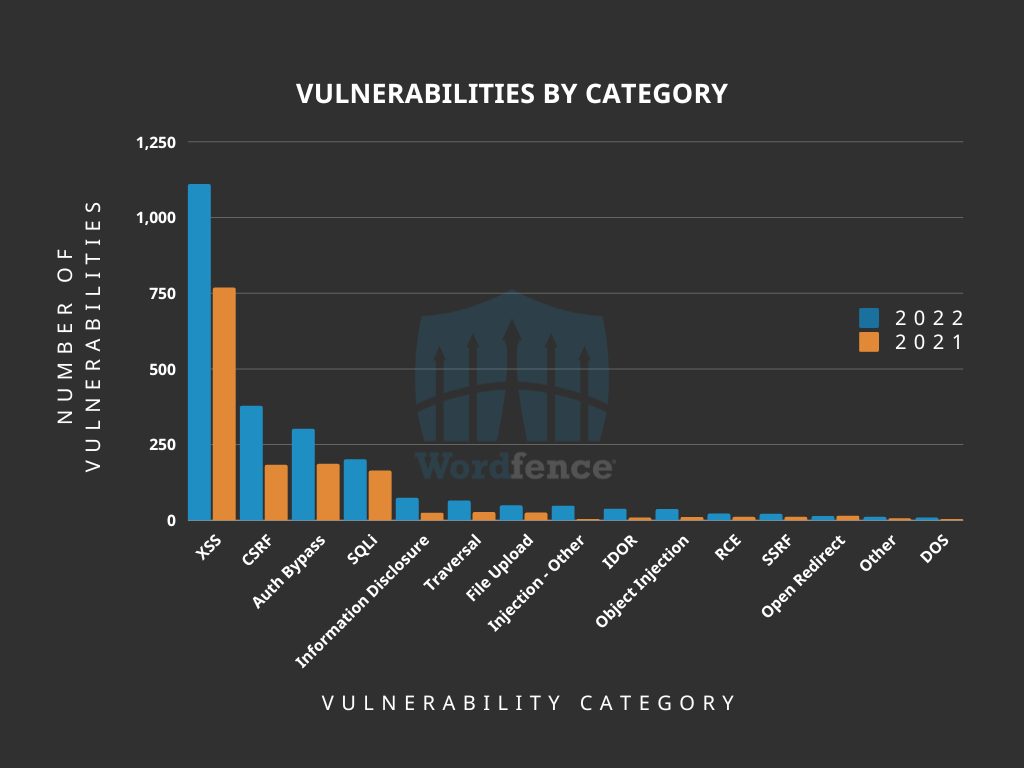
WordPress has been a popular website CMS platform since its inception in 2003. However, with popularity comes the risk of security threats. As we enter 2023, it’s essential to take stock of the current state of WordPress security.

Image source: WordFence
Between 2021 and 2022, significant changes in the top five categories of disclosed vulnerabilities occurred. One noteworthy change is that information disclosure has surpassed file uploads and has become the fifth most prevalent vulnerability category. This highlights the critical importance of securing sensitive and confidential data. Additionally, there has been a considerable increase in CSRF vulnerabilities, which have more than doubled and now occupy a higher position than authorization bypass vulnerabilities, which also experienced a near doubling from 2021 to 2022.

Image source: WordFence
Examining the distribution of where vulnerabilities were reported, it is evident that plugins comprise the overwhelming majority of reported vulnerabilities. It’s important to acknowledge that there are considerably more plugins than themes available, which naturally influences this statistic. Nonetheless, this emphasizes that the WordPress core platform is comparatively more secure, and any security concerns in the WordPress ecosystem may be attributed to plugins and themes.
Here are some quick WordPress security stats to consider, which we will expand on below:
Despite numerous efforts to improve security over the years, WordPress remains vulnerable to attacks due to outdated software versions and weak passwords. In fact, according to a report by Sucuri, almost 74% of hacked WordPress sites were using obsolete software at the time of the attack. Additionally, plugins and themes present potential vulnerabilities when not updated regularly.
That being said, notable improvements have been made in recent years toward enhancing WordPress security. These include automatic updates for core files and plugins and improved user password requirements.
Consider this fact: in 2022, a shocking discovery was made regarding the security of popular website plugins. It was found that 26 of these plugins contained critical security bugs that were never patched. Any websites running those plugins risk being hacked and having sensitive information compromised.
This revelation proves website owners cannot afford to be complacent regarding their sites’ security. With cyber threats growing more sophisticated daily, businesses must take all necessary steps to protect themselves and their customers. This includes regularly updating software and ensuring that any vulnerabilities are quickly addressed.
In 2022, we saw a significant increase in security bug reports for WordPress plugins. Specifically, 328 more bugs were reported than the previous year, bringing the total number of confirmed security bugs in our database to 4,528. This was a much more significant increase than in 2021 when only 1,382 security bugs were reported. These numbers demonstrate the importance of regularly monitoring and updating plugins for security vulnerabilities as soon as possible.
As one of the world’s most popular content management systems (CMS), WordPress is often targeted by cybercriminals seeking to exploit vulnerabilities in the platform’s code. WordPress has implemented several security measures to counter this threat over the years, including automatic updates and improved password policies. However, responsible disclosure is one of the most effective ways to make the WordPress ecosystem more secure.
Responsible disclosure has become more common in recent years, and the WordPress ecosystem has significantly benefited from this trend. Many security researchers who discover vulnerabilities in WordPress plugins, themes, or the core platform now choose to report them to the WordPress security team, which can then work with plugin and theme developers to release a patch.
One of the benefits of responsible disclosure is that it allows developers to release a fix for the vulnerability before it becomes widely known. This helps prevent cybercriminals from exploiting the vulnerability to compromise WordPress sites. When vulnerabilities are publicly disclosed before a fix is available, this is known as “zero-day” exploitation.
Responsible disclosure also allows WordPress users to patch vulnerabilities in a timely manner, reducing the risk of their sites being hacked. When a vulnerability is discovered and reported through responsible disclosure, the WordPress security team can work quickly to release a patch. Site owners can then update their plugins, themes, or the WordPress core platform to apply the patch and reduce the risk of compromised sites.
The WordPress community has recognized the importance of responsible disclosure, and several initiatives are now promoting this practice. For example, the WordPress Security Team has a dedicated email address for security researchers to report vulnerabilities. Many plugin and theme developers now include a responsible disclosure policy on their websites.
In conclusion, responsible disclosure is an essential practice for strengthening the security of the WordPress ecosystem. By responsibly and ethically reporting vulnerabilities to the WordPress security team responsibly and ethically, security researchers can help developers release patches quickly, reducing the risk of zero-day exploitation. WordPress users can also benefit from responsible disclosure by applying patches to their sites in a timely manner, reducing the risk of their sites being compromised. The WordPress community must continue to promote and encourage responsible disclosure to ensure the platform remains secure and reliable for years.





